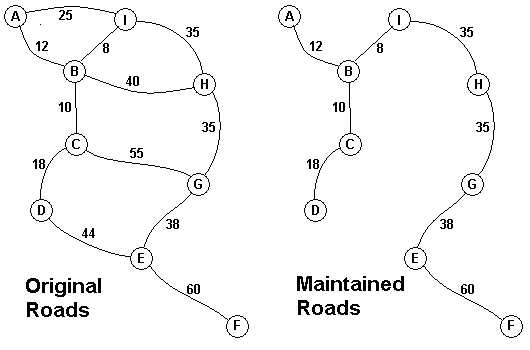标签:
题目链接:http://acm.hdu.edu.cn/showproblem.php?pid=1301

The Head Elder of the tropical island of Lagrishan has a problem. A burst of foreign aid money was spent on extra roads between villages some years ago. But the jungle overtakes roads relentlessly, so the large road network is too expensive to maintain. The Council of Elders must choose to stop maintaining some roads. The map above on the left shows all the roads in use now and the cost in aacms per month to maintain them. Of course there needs to be some way to get between all the villages on maintained roads, even if the route is not as short as before. The Chief Elder would like to tell the Council of Elders what would be the smallest amount they could spend in aacms per month to maintain roads that would connect all the villages. The villages are labeled A through I in the maps above. The map on the right shows the roads that could be maintained most cheaply, for 216 aacms per month. Your task is to write a program that will solve such problems.
The input consists of one to 100 data sets,
followed by a final line containing only 0. Each data set starts with a line
containing only a number n, which is the number of villages, 1 < n < 27,
and the villages are labeled with the first n letters of the alphabet,
capitalized. Each data set is completed with n-1 lines that start with village
labels in alphabetical order. There is no line for the last village. Each line
for a village starts with the village label followed by a number, k, of roads
from this village to villages with labels later in the alphabet. If k is greater
than 0, the line continues with data for each of the k roads. The data for each
road is the village label for the other end of the road followed by the monthly
maintenance cost in aacms for the road. Maintenance costs will be positive
integers less than 100. All data fields in the row are separated by single
blanks. The road network will always allow travel between all the villages. The
network will never have more than 75 roads. No village will have more than 15
roads going to other villages (before or after in the alphabet). In the sample
input below, the first data set goes with the map above.
The output is
one integer per line for each data set: the minimum cost in aacms per month to
maintain a road system that connect all the villages. Caution: A brute force
solution that examines every possible set of roads will not finish within the
one minute time limit.
题意描述:n个城市之间有一些道路连接和维修道路所需的花费,要求n个城市保持直接或间接道路通畅,求出最少花费。
算法分析:赤果果的最小生成树。(最近的切身体会:算法基础一定要扎实,不然高级一点的算法学了之后反倒基础全忘完了)
1 #include<iostream> 2 #include<cstdio> 3 #include<cstring> 4 #include<cstdlib> 5 #include<cmath> 6 #include<algorithm> 7 #define inf 0x7fffffff 8 using namespace std; 9 10 int g[30][30],vis[30]; 11 int n; 12 13 int Prim() 14 { 15 int t=n-1; 16 int sum=0; 17 while (t--) 18 { 19 int k,Min=inf; 20 for (int i=1 ;i<n ;i++) 21 { 22 if (!vis[i] && Min>g[0][i]) 23 { 24 k=i; 25 Min=g[0][i]; 26 } 27 } 28 vis[k]=1; 29 sum += Min; 30 for (int i=1 ;i<n ;i++) 31 { 32 if (!vis[i] && g[k][i]<g[0][i]) 33 g[0][i]=g[k][i]; 34 } 35 } 36 return sum; 37 } 38 39 int main() 40 { 41 while (scanf("%d",&n)!=EOF && n) 42 { 43 char str[5],s[5]; 44 int num,cnt; 45 for (int i=0 ;i<30 ;i++) 46 { 47 for (int j=0 ;j<30 ;j++) 48 g[i][j]=inf; 49 } 50 memset(vis,0,sizeof(vis)); 51 for (int i=1 ;i<n ;i++) 52 { 53 scanf("%s%d",str,&num); 54 int x=str[0]-‘A‘; 55 while (num--) 56 { 57 scanf("%s%d",s,&cnt); 58 int y=s[0]-‘A‘; 59 g[x][y]=g[y][x]=cnt; 60 } 61 } 62 printf("%d\n",Prim()); 63 } 64 return 0; 65 }
标签:
原文地址:http://www.cnblogs.com/huangxf/p/4394806.html